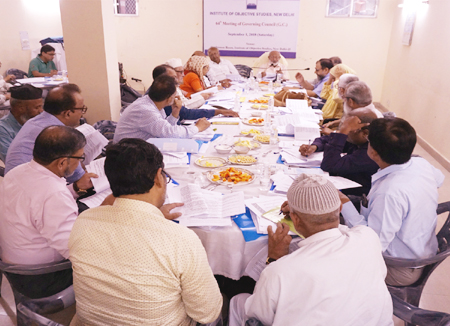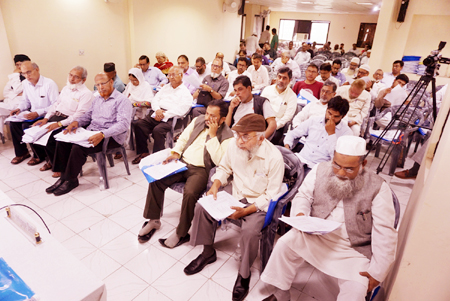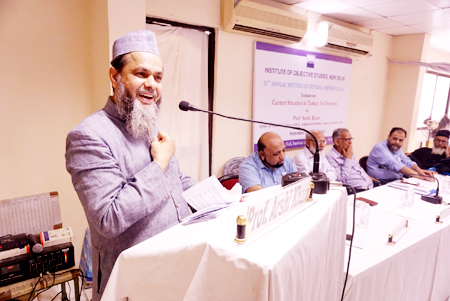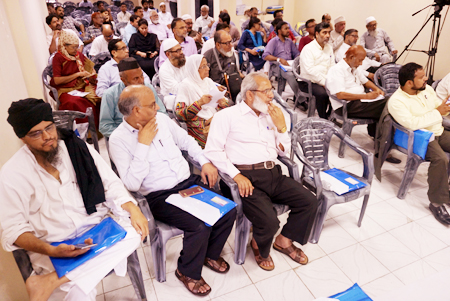Annual Meeting of IOS Governing Council & General Assembly Lecture on “Current Situation in Turkey: An Overview”
September 1-2, 2018 at at Institute Building, 162, Jogabai, Jamia Nagar, New Delhi

The 32nd meeting of the General Assembly (GA) of the Institute of Objective Studies was held here on September 2, 2018 to ratify the minutes of the previous GA, which met on August 13, 2017. The GA also considered the follow-up report on decisions taken at the last meeting. Besides, it approved the 32nd Annual Report of the IOS for the year 2017-2018 as recommended by the Governing Council (GC). The meeting was also marked by election of office-bearers and executive members of the Institute for a period of five years, i.e., 2018-2023. The executive members who formed the core group of 15 then re-elected the current chairman, IOS, Dr. M. Manzoor Alam, for a tenure of five years. Other office- bearers, who were elected include, Prof. ZM Khan as Secretary General, Prof. M. Afzal Wani as Vice-Chairman, Prof. Ishtiyaque Danish as Finance Secretary and Prof. Hasina Hashia as Assistant Secretary General.

The Governing Council that met on September 1, 2018, decided to task the IOS with a project relating to the study of educational, social and economic backwardness of Indian Muslims in the next few years. Explaining the purpose of the study, Chairman, Dr. Mohammad Manzoor Alam said that the history of the period of Muslim rule in India was being sought to be re-written in order to twist facts and willfully accommodate false and imaginary stories. He expressed concern that a new syllabus based on hate and bigotry was being readied to inject communal virus into the minds of the new generation.
The IOS was seized of the matter and effort would be made to work on an education policy commensurate with changing paradigms in the academia. A centre would be set up to thoroughly do the exercise. In respect of history, he said that in order to counter the negative influence of the existing syllabus, a constructive history would be written that could positively impact the minds of India’s millions.
Dr. Alam asked the members to come up with their valuable suggestions in the form of projects which could be taken up for execution. Making special mention of the year 2023, he said that the world would witness noticeable changes by then. India too would not remain unaffected by such upheavals. He stressed that scholars and ulema associated with the IOS would also have to play a significant role during the period leading to 2023. Relevant books published anywhere in the world would have to be procured and translated at the Institute. He urged social scientists to not only teach but also study the subject further in order to keep abreast of the latest developments in their subject.
It was decided at the meeting to organise a seminar on the life and works of Maulana Manazir Ahsan Gilani on December 1-2, 2018 at Patna. It was also decided to hold a workshop based on the book The Future of Political Islam, by Graham E. Fuller, with a view to finding out the extent to which it was useful for Muslims as also its negative impact, besides the factors leading to its popularity in the world in the last nine years. It was also a matter of enquiry to find out why the Muslim world remained oblivious to its popularity during this period.

The meetings were attended by members from the places as far as Hyderabad, Bengaluru, Chennai, Patna, Gaya and Kolkata and from states like Assam and Jammu and Kashmir. While Maulana Khalid Saifullah Rahmani, Dr. Fahim Akhtar Nadwi and Prof. Mohsin Usmani Nadwi came from Hyderabad, Maulana Mustafa Rifai Jilani and Maulana Baqar Arshad came from Bengaluru, Dr. Major Zahid Husain from Chennai, Prof. M. A. Quddus and Dr. Syed Fazle Rab from Patna, Dr. Ehtesham from Gaya, Mr. Abdul Basit Ismail Nadwi from Kolkata, Md. Shahabuddin and Dr. Nityananda Kalita from Assam, Prof. Hamid Nasim Rafiabadi from Jammu and Kashmir, Prof. Shakeel Ahmed, Dr. Moinuddin Khan and Dr. Malika B Mistry from Pune, Mr. Pervez Bari from Bhopal, Dr. Wakil Rizvi from Ranchi, Prof. Shamim A. Ansari, Prof. Arshi Khan, Prof. Zafar Mahfooz Nomani and Prof. Syed Jamaluddin from Aligarh, Prof. Manzoor Ahmad and Mr. Sanjay K. Rai from Lucknow, Ms. Suman, Mr. VB Rawat and Ms. Naaz Khair from Delhi.

The meeting was followed by a lecture on the “Current Situation in Turkey: An Overview” by Prof. Arshi Khan, professor of political science at AMU, Aligarh. Prof. Khan pointed out that the current economic crisis in Turkey was a fall out of the US economic crisis triggered by financial losses suffered by real estate. Three giant financial assessment agencies of the US controlling the world market – Credit Suisse, Moody and Standard and Poor, devalued the Turkish monetary unit lira against the dollar, leading to panic withdrawal of the currency in Turkey. Money worth 30 billion dollars was said to have been withdrawn in Turkey. However, Turkey was spared of the worst crisis due to its fundamentals being strong. It could be understood in terms of the value of lira which stood against the dollar - one dollar equal to 6 or 6.5 lira.
He said that the government led by President Recep Tayyip Erdogan swung into action and assured the panic buyers of dollar that their money was safe and that there was no danger to it. In a damage control exercise, two US nationals suspected to be sleuths were arrested. Relations between the US and Turkey did not nosedive as was apprehended.

Prof. Khan described the relations between the US and Turkey as close. Though Turkey suffered trade deficit to the tune of 55 billion dollars, this was cushioned due to the strong presence of the infrastructure sector in the country. Since Turkey was an emerging market, the inflation was on the rise due to the flow of money. He said that the debt owed by Turkey was half of the county’s GDP. As against 27.27 percent rate of unemployment in South Africa, it was 12 percent in Turkey. Projects in Turkey were financed by the private sector in the form of loan as the assets owned by the corporate sector were strong and sustainable.
Prof. Khan held that the unsuccessful bid to stage a coup by the Turkish army in 2016 could not find favour with the people at large. He said that Turkey stood out second in the world in the construction sector, with 46 out of 260 global companies being from the country. In Istanbul alone 96 skyscrapers were built. Eighteen percent of the country’s economy was controlled by construction companies. There was no dearth of power in Turkey as it was gas-based. He noted that the army coup failed due to the people’s participation in the democratic process. Large turnout of voters was evidenced in the last presidential elections held in June this year by paper ballot.
He said that Islam had been adopted as the recognised religion of Turkey, which was almost dismembered by European countries in 1918. It had emerged as a buoyant economy over the years.
The lecture ended with a vote of thanks by Prof. Ishtiyaque Danish.
|